

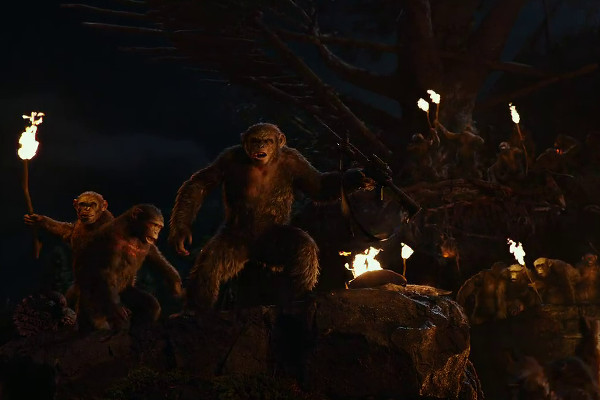
Comparing the successful reboot series with the original run of films is a difficult task, as they're very much two disparate entities. The new series, which began in 2011, tones down the lyrical and poetic side of the original films, instead imagining what a world taken over by apes would really be like, and showing audiences the emergence of that world in a time nearer to our own.
Gone are the rubber masks in favour of more anthropomorphically realistic creations, brought to life in impressive-enough CGI (albeit CGI that doesn't entirely hold up when watched in the greater definition of Blu-Ray) and Andy Serkis is terrific as a motion-capture Caesar.
There's a commendably experimental side to a lot of Dawn's content, as only two of the apes can fluently speak, leading to long stretches of dialogue-free scenes, with the other apes only able to communicate through shrieks and sign. (Coincidentally, the month before Dawn was released, a film called The Tribe was launched at Cannes, featuring no subtitles, and violent school children communicating only via Ukrainian sign language.)
Released in cinemas during a sparse period, Dawn was able to become a sizeable hit, breaking $700 million and becoming the eighth highest-grossing film of the year. Sadly, the follow-up, War for the Planet of the Apes, struggled financially in a more competitive time for cinema-goers, dropping to less than $500 million in box office, and so falling to the level of the "sleeper hit" take of Rise.
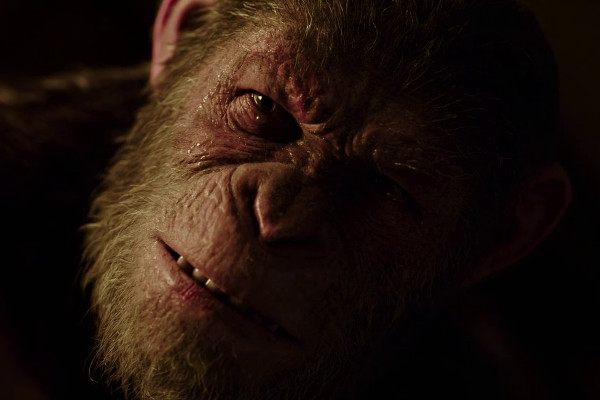
As with Dawn, War For The Planet Of The Apes was released in a 3D presentation as well as the standard 2D fare. The longest apes film on release, it can drag in spots, though thankfully largely steers clear of the Hollywood-style pyrotechnics that Rise and Dawn strayed towards. Instead, War tells a more emotional story, charting Caesar's struggles against a rogue army Colonel, played by Woody Harrelson.
With Harrelson's Colonel intent on building a wall, then political parallels form a part of the film's backdrop, particularly when Caesar slides down a US flag that's on fire. There are lighter moments, as with Steve Zahn's "Bad Ape", a humorous creation that can speak, but these don't overshadow the sombre tone at the heart of a more reflective entry.

Cinema was in such a bad state in 2024 that this film was in the top ten highest grossing movies for around half the year, despite not even reaching $400 million. Costing $160 million to make, it would have just about broke even when marketing budgets and cinema cuts were factored in. The film seemed to come out of nowhere, given that the previous entry was seven years earlier, but it had been in development since 2019.
At 145 minutes, it's 5 minutes longer than the previous entry, which was already the longest Apes film. The length is the main issue, as it begins at a ponderous, almost torturous pace, and seems to take forever to truly get going. Once it does, however, it rewards, with various twists and turns and one of the most oppressive future societies presented in the series.
Visually there's some truly beautiful scenes, and it has an ambition and sense of scale rarely seen in Apes films. With nearly every frame requiring CGI, it's not entirely convincing, but then neither is Roddy McDowall in a rubber mask, you just have to buy into it. Set generations after the first three reboot films, this one pitches an intriguing new trilogy and direction, with only the need for an editor's scissors preventing it from being something truly great.
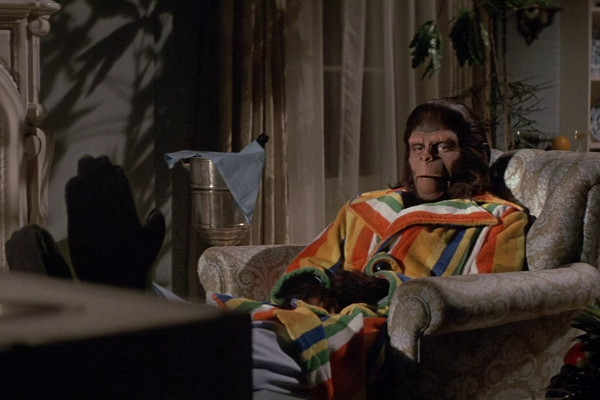
As with all of the original series sequels, Escape was written by Paul Dehn. Where it marks a real turning point is that this is the first time that the apes themselves have been the central characters, and the audience focal point.
While the first two films had a nihilistic nature towards mankind, and showed a variety of characters for the apes, it was still the humans the viewers were supposed to get behind, even if they were, as with Charlton Heston's Taylor, very much anti-heroes. Whereas the 2011 series gave us the apes as sympathetic figures right from the off, Escape marks the first real point that the apes themselves are the identification figures.
It helps that the characters are ones we have seen before, with Roddy McDowall and Kim Hunter back as Cornelius and Zira. (A third chimp, killed before twenty minutes in, sees the final film appearance of Sal Mineo). The greatly slashed budget, less than half that of the first sequel, does show on screen, and there is very much a "TV movie" feel to events, with flat lighting and some slightly staid direction at points.
However, while the humour sometimes threatens to become a little too "cute", and the viewer has to turn a blind eye to two shockingly fake "real" apes, this is the most light-hearted and charming of all the Apes films. That it ultimately takes a dark turn towards a tragic conclusion only makes it all the more powerful...
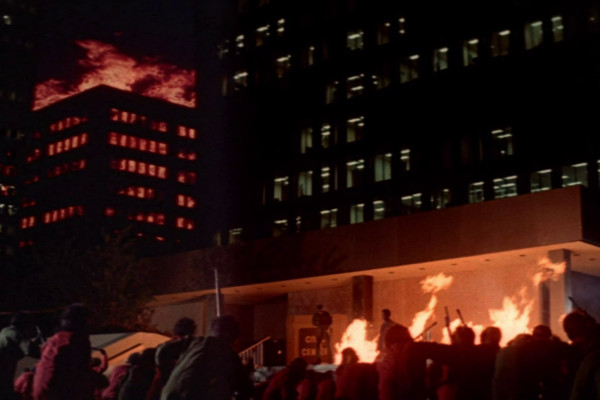
One thing perhaps overlooked with the apes series is just how subversive it was for the time it was made. Beneath took open shots at organised religion, and while the revolution may not have been televised, it made its way into cinemas during the summer of 1972. The version shown in cinemas was a heavily sanitised edit, with a cropped shot of McDowall's eyes as he delivered a hastily-written message of appeasement to conclude the film. The real ending, which shocked test audiences, sees no such appeasement.
There is, of course, an unfortunate negative connotation of making a science fiction parallel of race riots by using apes to depict it. Perhaps for this reason, charismatic (and politically active) Hari Rhodes plays one of the few sympathetic humans in the piece, beseeching McDowall's Caesar in the closing moments: "I, a descendant of slaves, am asking you to show humanity." Conquest's raw power was curtailed by studio interference, and the budget-cutting does harm it, but it remains, certainly in its uncut form, one of the most uncompromising and hard-hitting entries to be released under the Apes banner.
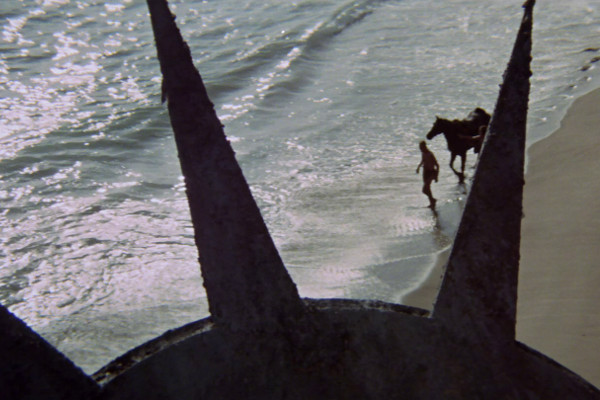
There can be little surprise that the original film made the top spot. Opening with Charlton Heston ruminating on the nature of man ("...still make war against his brother? Keep his neighbour's children starving?") he plays one of the most embittered, cynical men in all of Hollywood history. Although a lot of the satirical and political content is on the nose, it's done with a degree of wit, and Heston's mocking of American patriotism was a cinematic jolt back in the late 60s.
There's a school of thought that Planet of the Apes would have benefitted from having no sequels at all. Certainly, while many of the follow ups are fine entries, none of them are the genuine classic that this original is. Featuring a twist ending that's now so famous some DVD releases even inexplicably put it on the cover, it's only been alluded to in the image above. With a script written by The Twilight Zone's Rod Serling, and additional drafts written and polished by Michael Wilson, this is truly a standout work.